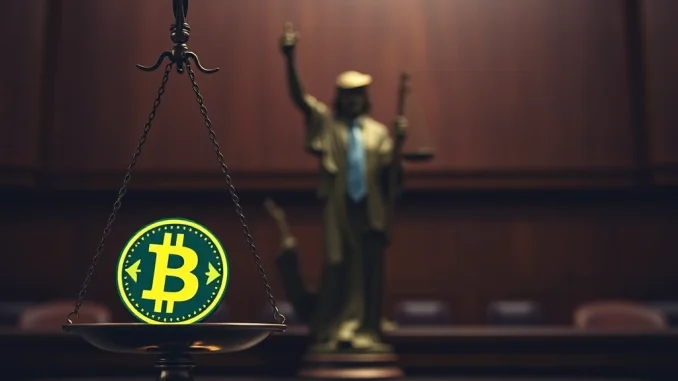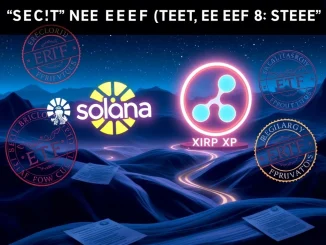
The cryptocurrency world is once again buzzing with political intrigue as U.S. lawmakers are now calling for a formal Securities and Exchange Commission (SEC) probe into a DeFi project linked to the Trump family. This latest development sees prominent figures like Senator Elizabeth Warren and Maxine Waters raising serious questions about World Liberty Financial (WLFI), a decentralized finance venture reportedly connected to the former president’s inner circle. Is this a legitimate concern about financial oversight, or another chapter in the ongoing political saga surrounding cryptocurrencies and the Trump name? Let’s dive into the details of this developing story and understand what it could mean for the future of crypto regulation.
Why is a SEC Investigation into Trump DeFi Project Being Requested?
The core of the lawmakers’ request for an SEC investigation revolves around potential conflicts of interest and the need for regulatory clarity in the rapidly evolving DeFi space. Senator Elizabeth Warren, a vocal critic of the crypto industry, and Maxine Waters, a leading voice on the House Financial Services Committee, are spearheading this initiative. Their concern, as highlighted in Warren’s statement on X (formerly Twitter), is straightforward: Given Donald Trump’s prominent position as a former president and his family’s involvement in World Liberty Financial (WLFI), there’s a pressing need to examine whether any conflicts of interest exist and if the project adheres to existing securities laws.
Here’s a breakdown of the key reasons behind the call for an SEC investigation:
- Potential Conflicts of Interest: With the Trump family’s high profile and past political influence, lawmakers want to ensure that no undue advantage or preferential treatment was afforded to WLFI, especially given the regulatory scrutiny surrounding the crypto sector.
- Regulatory Compliance in DeFi: The decentralized nature of DeFi projects often raises complex questions about regulatory oversight. The lawmakers aim to ascertain whether WLFI is operating within the bounds of securities laws, particularly concerning investor protection and financial transparency.
- Precedent Setting: This investigation could set a significant precedent for how DeFi projects, especially those with connections to public figures, are scrutinized and regulated in the U.S. It emphasizes the growing importance of regulatory clarity in the crypto space.
Understanding the Trump DeFi Project: World Liberty Financial (WLFI)
While details about World Liberty Financial (WLFI) are still emerging, it’s crucial to understand what we know so far about this Trump DeFi project. DeFi, or Decentralized Finance, aims to recreate traditional financial services in a decentralized manner, often using blockchain technology and cryptocurrencies. This can include lending, borrowing, trading, and other financial instruments, typically without intermediaries like banks.
Here’s what is currently understood about WLFI:
- Decentralized Finance Focus: As the name suggests, WLFI operates within the DeFi sector, likely offering some form of decentralized financial services. Specific details about its offerings are still not widely publicized, adding to the need for regulatory scrutiny.
- Trump Family Connection: The core of the controversy lies in the reported connection of the Trump family to this project. While the exact nature and extent of this involvement are unclear, it’s this association that has triggered concerns among lawmakers.
- Lack of Transparency: Like many emerging DeFi projects, WLFI may lack the transparency of traditional financial institutions. This opacity further fuels the call for an SEC investigation to ensure investor protection and market integrity.
Cryptocurrency Regulation and the Role of the SEC
This situation underscores the ongoing debate and challenges surrounding cryptocurrency regulation in the United States. The SEC plays a pivotal role in overseeing securities markets and ensuring investor protection. However, the application of existing securities laws to the novel and often borderless world of cryptocurrencies, especially DeFi, is a complex and evolving area.
The SEC’s approach to crypto regulation generally involves:
- Determining Security Status: A key aspect is whether a cryptocurrency or crypto asset is classified as a security. If deemed a security, it falls under the SEC’s jurisdiction and must comply with securities laws, including registration and disclosure requirements.
- Enforcement Actions: The SEC has been actively pursuing enforcement actions against crypto firms it believes are operating in violation of securities laws. These actions range from fines and penalties to cease-and-desist orders.
- Guidance and Clarity: The crypto industry has repeatedly called for clearer guidance from the SEC on how existing regulations apply to digital assets. While the SEC has provided some guidance, many in the industry feel more clarity is needed to foster innovation while ensuring compliance.
Elizabeth Warren Crypto Stance: A Driving Force Behind Scrutiny
Senator Elizabeth Warren crypto stance is well-documented. She has consistently voiced concerns about the risks associated with cryptocurrencies, including investor protection, illicit finance, and systemic risks. Her involvement in this request for an SEC investigation is not surprising, given her history of advocating for stricter crypto regulation.
Warren’s key arguments against crypto often include:
- Investor Protection: She emphasizes the potential for scams, fraud, and market manipulation in the crypto space, arguing that retail investors are particularly vulnerable.
- Illicit Finance Concerns: Warren has raised alarms about the use of cryptocurrencies for illicit activities like money laundering and terrorist financing.
- Systemic Risk: As the crypto market grows, she worries about its potential to create systemic risks within the broader financial system, especially if it becomes more interconnected with traditional finance.
What Happens Next with the DeFi Project Investigation?
The request from Warren and Waters is a significant step, but what are the potential next steps in this DeFi project investigation? The SEC will now need to consider the lawmakers’ request and decide whether to initiate a formal investigation into World Liberty Financial (WLFI). This process could involve:
- SEC Review and Assessment: The SEC will likely review the information provided by Warren and Waters, along with publicly available information about WLFI, to assess the merits of an investigation.
- Formal Investigation (if initiated): If the SEC decides to proceed, it could launch a formal investigation, which may involve subpoenas, information gathering, and interviews to determine if any securities laws have been violated.
- Potential Outcomes: Depending on the findings of the investigation, the SEC could take various actions, ranging from no action if no violations are found, to enforcement actions like fines, penalties, or orders to cease operations if violations are discovered.
Conclusion: A Pivotal Moment for Crypto and Regulation
The call for an SEC investigation into the Trump DeFi project WLFI marks a pivotal moment for the cryptocurrency industry and its relationship with regulators. It highlights the increasing scrutiny being placed on DeFi projects, particularly those with connections to high-profile figures. Whether this investigation leads to significant regulatory action or not, it underscores the growing pressure for clarity and accountability in the crypto space. As the crypto landscape continues to evolve, this situation serves as a potent reminder of the intersection of politics, finance, and the burgeoning world of decentralized technologies. The outcome of this potential investigation could have far-reaching implications for the future of DeFi and cryptocurrency regulation in the United States and beyond.



